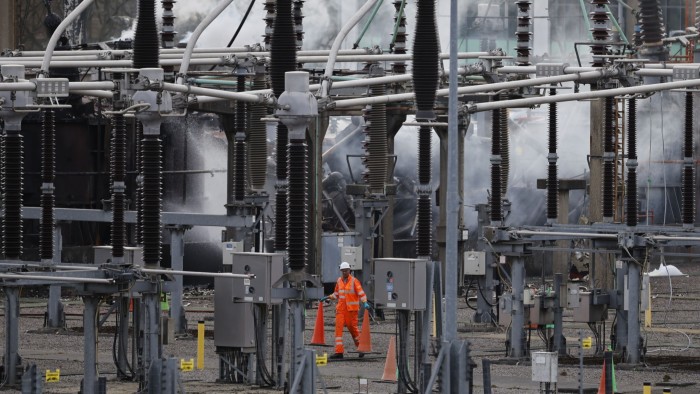Britain’s energy regulator is carrying out special monitoring of the National Grid as the company faces questions over whether it is doing enough to maintain key electricity networks.
The FTSE 100 company is undergoing quarterly reviews by Ofgem in relation to investment in its network of high-voltage cables, where refurbishment work has been set back by problems including supply chain delays.
The reviews began last year, before the fire in March at a National Grid substation that led to the closure of Heathrow airport and thrust the company into the spotlight.
The resulting power cut knocked out Europe’s busiest hub for 24 hours and led to significant disruption for homes and businesses.
An official report last month concluded that the substation fire was likely caused by moisture getting into a key part of the transformer, and that National Grid had failed to replace the part despite high moisture readings at its last basic maintenance in 2018.
An earlier Ofgem report had noted “concerning” underspending by National Grid’s transmission business, with maintenance work outstanding.
In response to questions from the Financial Times over these findings, Ofgem said it was carrying out regular reviews into National Grid’s performance in the maintenance and refurbishment of its transmission network.
It said the reviews started in 2024 and were agreed by both parties during “engagement and monitoring” and were separate to its wider engagement with National Grid on other parts of its business plan.
National Grid denied there was a specific quarterly review into the health of its assets, but said there was “quarterly engagement with Ofgem on overall delivery against our [transmission] business plan, covering all aspects of our work”, which it said it had itself proposed.
“We believe this proposal allows for a richer picture of our performance than a one off annual report,” it said.
Separately, Ofgem is investigating National Grid’s compliance with licence conditions relating to the same substation at the centre of the Heathrow fire, and to a substation near Carlisle in northern England. The latter probe started in 2022.
National Grid is one of the private companies that own and run Britain’s electricity transmission and distribution networks, along with SSE, Scottish Power, UK Power Networks and Berkshire Hathaway’s Northern Powergrid.
The sector has faced questions over reliability, including in the aftermath of significant storms in 2021 and 2022 when tens of thousands of homes suffered lengthy power cuts.
The resilience of the UK’s electricity networks is also under increasing scrutiny as the country transitions away from fossil fuels and towards renewable-powered electric vehicles and heating systems, and builds more energy-intensive data centres.
Dieter Helm, an energy expert and professor of economic policy at Oxford university, said the cost of power supply interruptions was “phenomenally higher now than it has been in the past”.
Mathew Lawrence, director of the Common Wealth think-tank, said transmission network owners had “habitually underinvested” in maintenance and called for a shift from an “asset sweating to an asset building” system.
A senior official at the Prospect trade union told the FT last week that electricity networks were underinvesting in maintenance.

National Grid has put itself at the centre of the shift in Britain’s energy system, adding to its transmission network by buying the UK’s largest electricity network in 2021, and selling its stake in Britain’s gas transmission network.
Its strategy has been led by chief executive John Pettigrew, who said in April that he would step down later this year after nearly 10 years in the role. He was paid £6mn in 2024-2025.
Ofgem regulates how much network owners can spend and charge consumers, via five-yearly price controls, and monitors whether they are spending too much or too little.
National Grid’s transmission business spent 19 per cent less than its unadjusted allowances of £1.3bn for refurbishment and replacements between 2021 and 2024, the Ofgem report said.
This was due to factors including difficulties getting hold of contractors and supplies in a tight market, the report added, while some investments had been recategorised.
National Grid said it expected this gap to close by 2026, forecasting that by then it will have spent more than its allowance.
The company changed its policy in 2023 to make maintenance of its biggest transformers less frequent. It said this was in line with best industry practice.
National Grid’s transmission division said it had spent £5bn in total on asset health over the past 10 years and plans to spend an additional £5bn on asset health over the next five years.
“National Grid is investing record levels in maintaining our assets and as Ofgem note in their performance report, we will be investing more in the network than we forecast at the start of the price control period,” the company said. “Great Britain has one of the most reliable networks in the world.”
